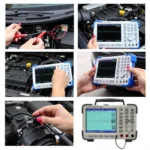More and more DIYers are interested in diagnosing their car problems themselves before heading to the mechanic. With the rise of affordable OBD2 scanners and a wealth of information available online, it’s tempting to think you can save time and money by doing your own diagnostic car work. But is it really that simple?
Understanding Car Diagnostics: More Than Just Reading Codes
While an OBD2 scanner can read the trouble codes stored in your car’s computer, this is just the first step. It’s like reading the symptoms of an illness in a medical textbook; you still need to understand the underlying cause and the right course of action.
For example, a “check engine” light could be triggered by something as simple as a loose gas cap or as complex as a failing catalytic converter. Free car diagnostic AutoZone services can provide the initial codes but may not have the expertise to give you a definitive diagnosis.
The Skills and Knowledge Needed for Effective Car Diagnostics
Accurate car diagnostics require a deep understanding of automotive systems, including:
- Mechanical Systems: Engine, transmission, brakes, suspension
- Electrical Systems: Battery, alternator, starter, wiring harnesses
- Electronic Systems: Sensors, actuators, control modules
You’ll need to be comfortable interpreting technical diagrams, using multimeters and other diagnostic tools, and applying logical problem-solving skills.
“Modern vehicles are incredibly complex,” says John Miller, a certified master mechanic with over 20 years of experience. “It’s not just about reading codes; it’s about understanding how the systems interact and using that knowledge to pinpoint the root cause of a problem.”
When DIY Car Diagnostics Makes Sense
DIY car diagnostics can be a good option if you:
- Have a basic understanding of car mechanics and electronics.
- Are comfortable using diagnostic tools and interpreting data.
- Are working on a simple or common problem.
- Are willing to invest time in research and learning.
Even then, it’s essential to proceed with caution and avoid attempting repairs beyond your skill level.
The Risks of Incorrect Car Diagnostics
Misdiagnosing a car problem can lead to:
- Unnecessary repairs and wasted money.
- Further damage to your vehicle.
- Safety hazards for you and others on the road.
In some cases, an incorrect repair can even void your car’s warranty.
The Value of Professional Car Diagnostics
While DIY diagnostics have their place, there are many situations where seeking professional help is the safest and most cost-effective approach. A qualified mechanic has:
- Advanced diagnostic equipment: This can include specialized scanners, oscilloscopes, and software that can access and analyze data beyond the capabilities of basic OBD2 scanners.
- Years of experience: They’ve likely encountered a wide range of car problems and can quickly identify the root cause of an issue.
- Access to technical resources: They can consult manufacturer databases, service bulletins, and other resources to stay up-to-date on the latest diagnostic and repair procedures.
Finding the Right Balance: DIY vs. Professional
Ultimately, the decision of whether to tackle car diagnostics yourself or seek professional help depends on your comfort level, the complexity of the problem, and the potential risks involved.
If you’re dealing with a simple issue and have the time and knowledge to invest, DIY diagnostics can be a rewarding experience. But if you’re unsure about any aspect of the process, it’s always best to err on the side of caution and consult with a qualified mechanic.
FAQ
Q: Can I use my phone for car diagnostics?
A: Yes, there are several computer for diagnostic car apps available that work with Bluetooth OBD2 scanners. However, their functionality and accuracy can vary.
Q: Are all OBD2 scanners the same?
A: No, OBD2 scanners range from basic code readers to advanced professional-grade tools.
Q: What are some reliable sources for car diagnostic information?
A: Reputable automotive forums, manufacturer websites, and online repair manuals can provide valuable insights. However, be cautious of outdated or incorrect information.
Q: Can car diagnostic tools fix problems?
A: No, diagnostic tools are for identifying problems only. Repairs require separate tools and procedures.
Q: How can I avoid car diagnostic computer scam?
A: Be wary of unrealistic claims, high-pressure sales tactics, and individuals or businesses without proper credentials.
Need Help with Your Car Diagnostics?
Whether you need help interpreting those car alarm diagnostics or are considering a buy now pay later diagnostics car tool purchase, DiagFixPro can guide you through the process. Contact us today for expert advice, reliable information, and peace of mind.
Contact us via WhatsApp: +1(641)206-8880 or Email: cardiagtechworkshop@gmail.com. Our dedicated customer support team is available 24/7 to assist you.
